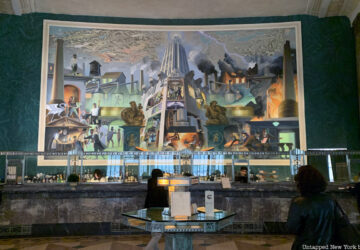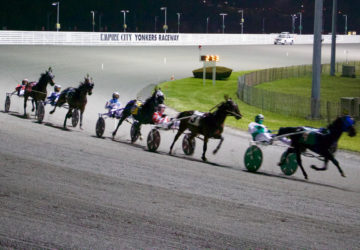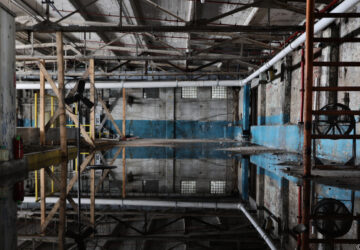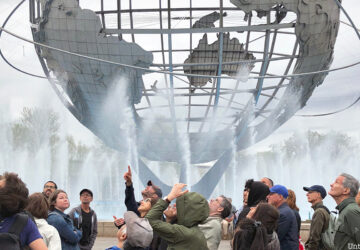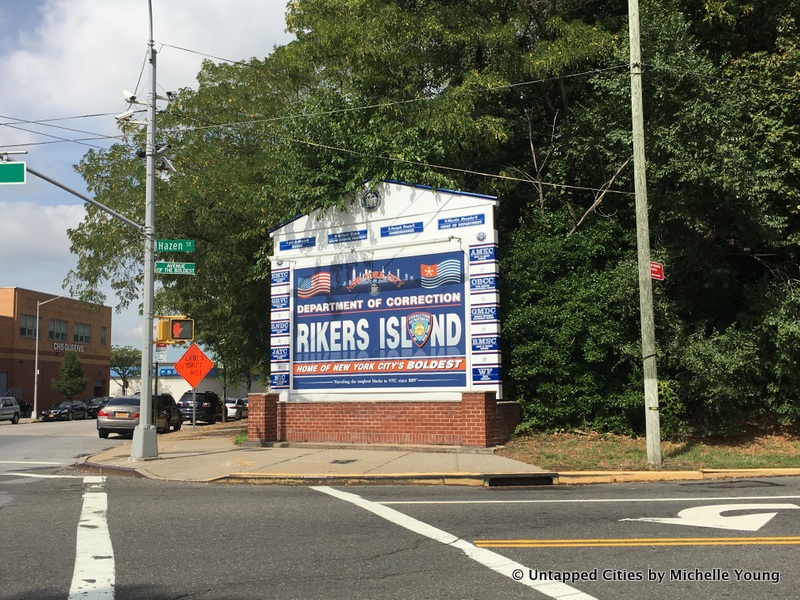The third season of Mozart in the Jungle, an Amazon series created by Roman Coppola about the fictional New York Symphony and the classical music world in New York City premiered this past Friday, December 9th. The season takes place in New York City and in Venice, with another group of star-studded guest appearances including Italian actress Monica Bellucci, opera singer Placido Domingo, film composer Nico Muhly, and NBA player Baron Davis. One of the standout episodes this season, “Not Yet Titled,” is a documentary style episode filmed in 16mm film that takes place inside Rikers Island, New York City’s largest corrections facility. It’s an incredible feat of filmmaking, truly melding the line between faux and real.
The production brought in a real orchestra and the Amazon in the Jungle cast to perform for Rikers Island detainees in the jail yard, with the backdrop of the New York City skyline behind. Coppola tells Paste Magazine, “I knew I wanted to do an episode in a jail or a prison, and Rikers allowed us, invited us to do it.” Given all the controversy over Rikers Island and attempts to close the jail by activist organizations like Just Leadership USA and many others, the episode does so much to highlight the humanity of the incarcerated, their physical reality, and their potential. Actual Rikers Island detainees were filmed watching the concert and several were interviewed after for the documentary. As a jail, rather than a prison, Rikers Island only holds those awaiting hearings and trials, and those convicted with sentences of less than a year.
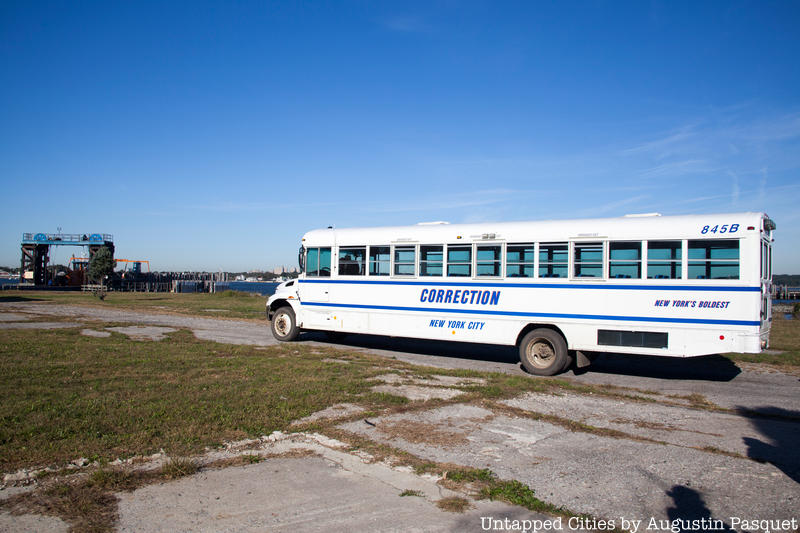
The orchestra, under the direction of their maestro Rodrigo de Souza (played by Gael Garcia Bernal) performs two works by French composer Olivier Messiaen, who was held in a concentration camp in Germany (in an area that is now Poland) during World War II. His “Quartet pour la fin du temps (Quartet for the End of Time),” was written while in the camp and premiered there, with two other professional musicians – a cellist and clarinetist – who were imprisoned. The music was inspired by text from the Book of Revelations. Coppola says that he asked his staff, “”I want to play some music that might have some relevance to people that might be in this situation,'” and one of his writers, Peter Morris, suggested Messiaen.
In the episode, Rodrigo announces to the audience in the episode, “What we are going to play today are pieces by the same composer, Olivier Messiaen. He fought in the Second World War and he was taken prisoner. And most of his most important, prominent works come in the time when he was in the prison camp.”
One of the detainees tells the camera in an interview, “In the beginning, I didn’t know what was going on but then I saw the orchestra. And I said, ‘I don’t like that kind of stuff.’ So I just sat down and for the first time in my life, I enjoyed it because it’s something…something that I experienced for the first time in my life. I never experienced something like that.” Another says, “Never heard, really, music like that. Even though I lived in New York my whole life, never went to no concert like that, nothin’ so it was an experience.” Another says with eyes closed, “I just closed my eyes and I was letting the instruments just come to me and I just felt free like that, you know? It was just..it was just… a different type of feeling. Like you could say, I was in, like, a trance. Like I was here physically, but emotionally and spiritually, like, I was, you know, gone.”
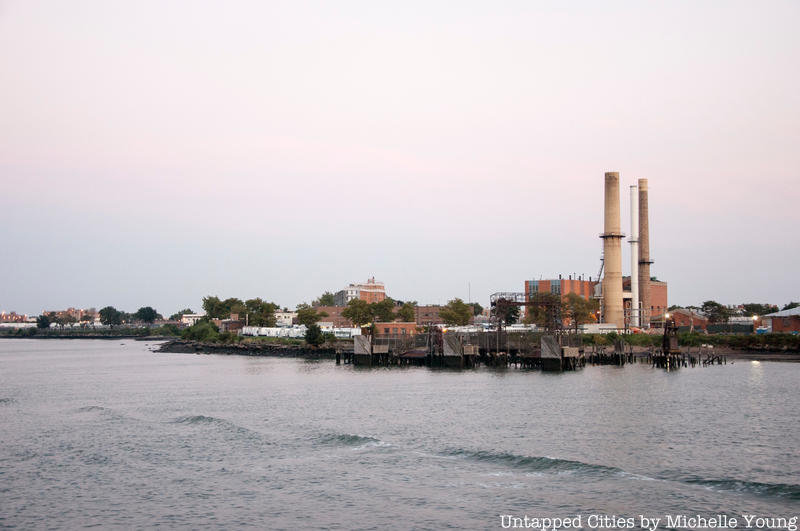
After the first part of the performance of Quartet for the End of Time, Rodrigo tells the audience, “So, Messiaen, he used all his senses when he was imprisoned to escape. He believed that the music gives the power to fly. He loved birds, and amongst them was the nightingale…This is a bird that sings at night only. This bird you cannot see, but you can listen.” A clarinet then plays an impressive solo from the quartet, titled “Abîme des oiseaux” (Song of the Birds).
There is also a piece within the quartet for the instrument, the Ondes Martenot, a unique electrical French instrument invented by the engineer Maurice Martenot in 1928 and favored by composers like Messiaen. The musician, Suzanne Farrin, Chair of Music at Hunter College who plays the instrument in the scene says, “I always imagined that I would play this instrument in a jail…because it was born out of such a utopic vision and its the one sound that Messiaen took with him when he went to prison.”
The orchestra also performs the exuberant Turangalila Symphony, written from 1946 to 1948. Rodrigo says, “Messiaen was very sure that at the end, love conquered all, and that hope was there. He wrote this piece straight after he came out of prison.”
The “documentary” concludes with a few more interviews. One man says, “See, I – I always wanted to go see an orchestra, a symphony orchestra. I mean, to take my girl out and black tie and everything. It’s my first time being there in an orchestra and it was – an experience. And it was, uh, nice. It was a beautiful experience.”
Another says, “I’ve never before saw an orchestra play until yesterday. And it was magnificent. I can’t even describe it, my hair is rising up.”
Rodrigo says (and here, you’re pretty sure it is Gael Garcia Bernal speaking from his heart, rather than a script): “It was incredibly memorable to see how they would like close their eyes, and just listen to the music. It was incredible. that’s going to stay with me, watching them listening to the music and letting themselves go.”
One of the detainees interviewed earlier in the episode tells the camera, “I could zone out. It just makes me think of my family. Peace of mind, you know. Tranquility, I could really just fall asleep to it, have good dreams to it, just peaceful, basically, for real.
Another says, “I had my mind in a lot of different places. Some – like, sometimes, I went dark, sometimes I went happy. Life, death, freedom. The feeling that got dark was positive. You know? Nothing was negative about that experience.”
Another recalls, “I found myself smiling a lot, and I found myself lost, you know just hearing a lot of the sound. You know, it’s just hard to just let yourself go the way you really want to, but yeah, it bring a lot of feeling.”
The same man earlier who initially thought he didn’t like this type of music asks, “This is gonna be a once in a lifetime thing, right? Wonderful, beautiful. I enjoyed it. Beautiful.”
And a final detainee reflects on the ephemeral nature of the event. “It took me a way from where I’m at, definitely did. You know, it made me think a lot. As the birds were flying, it was a very beautiful day. Even when I went out to the yard today, I went out earlier and did my little work out, and I seen and said, wow, everything is gone, like yesterday, everything was there, and then today everything’s gone just like that. But I could still imagine, like, seeing everything in my head. Everything was just there yesterday…and the vibe was just brilliant. It’s great.”
The effect truly pushes the boundaries of the series, the genre of a comedy, and raises awareness on the critically important issue of mass incarceration not only here in New York City, but also around the country.
Check out film locations for season 3 of Mozart in the Jungle and where else the show is filmed in NYC in the first two seasons. Read about the Secrets of Rikers Island and read about Untapped Cities’ work inside Rikers Island previously.
